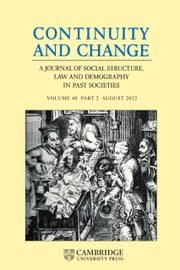Article contents
Print culture, crime and transportation in the criminal Atlantic
Published online by Cambridge University Press: 04 April 2007
Abstract
Stories of transported criminals were exchanged in the print culture of the eighteenth-century British Atlantic, creating images of the incorrigibility of transported criminals and of the failures of transportation, with many either re-offending in America or returning to do so in England. This discourse also framed images that each side of the Atlantic had of the other. The British learnt that the plantations were a place of slavery, the Americans that the British viewed them as a ‘race of convicts’. This process, involving many layers of discourse in the criminal Atlantic, formed one of the earliest examples of international debates on crime and national identity.
Information
- Type
- Research Article
- Information
- Continuity and Change , Volume 22 , Issue 1: Special Issue on Newspaper Reporting of Crime and Justice , May 2007 , pp. 49 - 71
- Copyright
- 2007 Cambridge University Press
- 3
- Cited by

